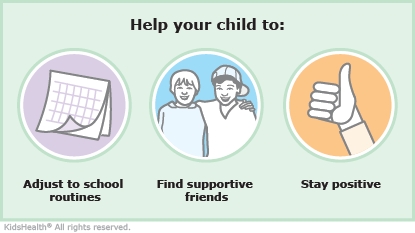Helping Your Child Return to School After a Long-Term Illness
Going back to school after a long-term illness lets your child return to a regular schedule, reconnect with classmates, and feel that things are getting back to normal. Work with your health care team and the school to help your child ease back into it. Be patient as your child gets used to school again. It may take some time.


To help your child get ready to go back to school:
Talk to your child about returning to school. Returning may be stressful for your child. Listen to your child and encourage them to share their feelings about it. Encourage them to talk to you or a counselor about any worries.
Encourage your child to let friends know they will be returning to school. They may want to plan to walk into school together or sit at lunch together.
Be positive. Remind your child of previous good experiences in school. Talk about what school clubs and activities could be fun and relaxing for them.
Meet with the school nurse, teacher, guidance counselor, and/or principal before your child goes back to school. At this meeting, talk about the plan for:
-
Your child taking medicines at school.
-
Any dietary needs your child has.
-
What sports activities are OK.
-
Catching up on schoolwork. You can set up a timeline for any catch-up work your child needs to do. Ask what support is available (such as tutoring) to help your child catch up.
-
What services are available to your child. Services vary between schools. Your child might be able to have an IEP (individualized education program) or a 504 plan. These can give your child accommodations like extra time for tests and assignments or the use of an elevator.
-
When to call you if your child is having problems.

What if my child is not ready for a full week at school? If needed, ease your child back into the school routine. Some kids do better by going to school for half days or a couple days a week at first.
How can I prepare my child for questions about their illness? Classmates may ask your child questions about where they have been, about their illness, or about any physical changes or new needs. Help your child prepare for these questions and decide how much they would like to share. Role-play with your child to come up with answers to questions such as, "Why were you out of school?" Let your child know that it is OK to politely answer, "I don't want to talk about that right now."